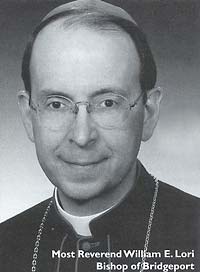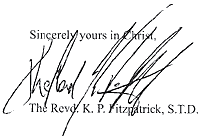The Most Reverend William E. Lori
Bishop of Bridgeport
238 Jewett Avenue
Bridgeport, CT 06606
J.M.J.
March 21, 2002
Your Excellency,
Your letter to Mr. William Connelly of March 1 has been forwarded to me, along with the March 5 letter of Father Kevin Fitzpatrick of St. Theresa's in Trumbull. Since Mr. Connelly, along with all the faithful of your diocese, has a right to know the truth, it is my duty to correct the serious errors contained in both of these letters.
The priests of the Society of Saint Pius X have never claimed to have faculties to hear confessions. In fact, we have repeatedly stated the contrary, namely that our bishops do not have jurisdiction to grant faculties and that our priests consequently do not have ordinary jurisdiction, given the refusal of bishops like yourself to grant us the faculties that we deserve.
You go on to state that the only circumstance in which our priests could receive supplied jurisdiction from the Church would be in the case of danger of death. Unfortunately, you do not seem to be familiar with the extent of the Church's supply of jurisdiction. Father Fitzpatrick mentions in his letter an additional circumstance, namely that of common error. As Canon 144 of the 1983 Code indicates, whenever a priest without faculties hears confessions in a Catholic church, the Church supplies the jurisdiction for those confessions to be valid. The Canon Lawyers are very explicit that the persons who go to Confessions do not have to be in error. They can know full well that the priest does not have Ordinary Jurisdiction. For Jurisdiction to be supplied, it is not necessary for people to be actually deceived. It suffices that it be an interpretative error, that is a fact that would induce Catholics to think that a priest has faculties, and this applies even when the faithful are fully aware that the priest does not have Ordinary Jurisdiction. (Cf. Bucceroni, Vidal, Cappello, Regatillo & Zalba, Coronata, Vermeersch & Creusen, Aertnys & Damen, Pugliese, Van Kol, Lombardia). This certainly applies to the churches of the Society of Saint Pius X, since they are Catholic churches.
Furthermore, Canon 1335 of the 1983 Code is entirely explicit about the supplying of jurisdiction for a priest who has incurred a censure, provided that it has not been declared, as is the case with the Society's priests. Any of the faithful can request a sacrament, even when its administration requires the exercise of an act of jurisdiction, and the priest can validly and licitly administer the sacrament. The same Canon indicates that it is permissible for the faithful to request such a priest to hear their confession "for any just reason at all". The moral theologians explain a just reason in the broad sense, as you know, as anything reasonable that would be of help to their souls, for example because they have confidence in traditional priests and in the spiritual direction that they give them in the confessional. Consequently, there is no doubt that the faithful have the right to request the sacrament of Penance from the priests of the Society, that the Church supplies jurisdiction, and that our priests validly and licitly hear these confessions. This is a canonical conclusion that must be accepted even by those who maintain that we have incurred a censure, and who refuse to accept the crisis in the Church, which is the reason for our resistance to the Novus Ordo.
However, if there ever were any doubt in the mind of a Catholic (or a priest or bishop), the Church is very willing to give the full certitude as to the validity of the sacraments. It is once more Canon 144 (1983 Code) that removes any possible doubt from this question, in order to guarantee the validity of the sacraments. It assures us that the Church supplies jurisdiction for confessions "in positive and probably doubt about law or about fact". Such a doubt exists, as every Canon Lawyer knows, whenever there is an objective foundation for assenting to a doubtful proposition, either concerning the existence or the extent of the law, or whether it applies to a particular circumstance. A person might doubt about the arguments given above concerning Common Error and priests who are censured. However, no reasonable person can dispute that there are objective arguments that traditional priests have supplied jurisdiction. Consequently, if ever there is a doubt in somebody's mind, he can be sure that the Church supplies the jurisdiction, and thereby entirely removes the doubt. The Church refuses to allow such a doubt to exist with respect to the validity of the sacraments, since they are so necessary for salvation.
Here lies the response to Father Fitzpatrick's argument that a person should take the safest course (pars tutior) when it comes to the administration and reception of the sacraments. He is perfectly correct in his principle. However, he forgets that the supplying of jurisdiction in the case of positive and probable doubt eliminates completely and entirely any lack of certitude concerning the validity of the absolution granted by traditional Catholic priests. Consequently, there is no greater certitude at all in receiving the sacrament from a Novus Ordo priest who has jurisdiction.
Much to the contrary, we recommend to our faithful that they have every right to use the supplied jurisdiction provided by the Church. They all know perfectly well that very numerous are the priests in the Novus Ordo who no longer believe in hell, judgement, purgatory, in the gravity of mortal sin, in the importance of doing penance, of confessing venial sins, and of frequent, regular confessions.
They have all been scandalized by the lack of respect in the administration of this sacrament, and the lack of concern of the minister for the profound and perfect contrition of the penitent. They know full well that they will only be assured of receiving a valid and fruitful sacrament, administered with the correct form and intention, with appropriate spiritual direction, with a patient but firm rebuking of their faults, with care to obtain a firm purpose of amendment, from those priests who administer the sacrament as it was always administered before Vatican II came along to distort the whole traditional teaching on sin and penance.
With all due respect, Your Excellency, there is an inherent contradiction in your letter. You falsely maintain that we have been declared schismatic. If it were true, as Father Fitzpatrick correctly points out in his letter, there would be no doubt as to the validity of our confessions. If this were the case, we would not need jurisdiction from the Roman Catholic Church.
This is but the logical consequence of Canon 844, §2 (1983 Code), which declares that Catholics can ask non-Catholic ministers (whose sacraments are valid) to hear their confessions whenever "genuine spiritual advantage suggests it". Consequently, if the Society's priests are schismatic and non-Catholics, as you say we are, then any Catholics (and not just members of a sect, as Father Fitzpatrick falsely affirms) can licitly and validly request the sacrament of Penance from us if they find a spiritual advantage in doing so.
This being so, your letter does not make any sense. You attack us for not having jurisdiction in the same letter that you maintain that we are schismatic and have no need of jurisdiction for valid confessions. Either we do need jurisdiction or we do not, please make up your mind. But in any case, as I am sure you will agree by now, our priests validly hear confessions.
However, I must register a strong protest against this Canon 844, which permits sacramental sharing with non-Catholics, along ecumenical principles. This damages greatly the unity of the Catholic Church, and causes the grave scandal of indifferentism.
I further register a strong objection to your accusation that we "have been declared as schismatic and excommunicated". If you read the decree Ecclesia Dei adflicta you will see that it is only the Society's bishops who were declared to have incurred an ipso facto excommunication. They were not declared to be schismatic, which is the reason why Bishop Licinio Rangel and the priests and faithful of Campos were not absolved from any censure for "schism" when they were received into "full communion" on January 18, 2002.
Furthermore, the declaration of "excommunication" for episcopal consecration without papal mandate was manifestly null and void in virtue of Canon 1324, §§ 5 & 8 (1983 Code), which states that even if a bishop errs in thinking that he is in a state of necessity for consecrating bishops, and in fact there is not really a state of necessity, he does not incur the censure of excommunication. Archbishop Lefebvre was most assuredly in a state of necessity on account of Rome's refusal to approval the traditional Mass, and to guarantee the future of the traditional priesthood. Nevertheless, even those of you who think that he was not in a state of necessity must admit that he did not incur the excommunication.
However, the question of the priests of the Society of Saint Pius X is entirely different. We have never incurred the censure of excommunication, nor has it ever been declared with respect to us. We are manifestly not schismatic, since we are in union with the Roman Pontiff (regardless of the fact that we are in profound disagreement with him concerning Vatican II and its terrible fruits of destruction within the Church) and with all Catholics subject to him who adhere to the integral Catholic Faith (Canon 751, 1983 code).
Please consider this as a formal request that you grant faculties to the priests of St. Ignatius Retreat House in Ridgefield, CT for them to hear confessions in the retreat house and throughout the diocese. They are Fathers Gerardo Zendejas, Christopher Darby and Eric Simonot. Since they are thoroughly Catholic, in union with Rome, and doing the work of the Church, you have no other reason to refuse this request than your opposition to the work of Catholic Tradition.
If you refuse to rise to the challenge, you can be sure that they will continue to hear Confessions through supplied jurisdiction, aware that once again justice will have been denied to those Catholic faithful who are the most zealous defenders of the Church. Thus the Society priests will guarantee the right of the faithful to the ready access to this sacrament from traditional priests, as provided for in Canon 213 of the 1983 Code of Canon Law, even when refused by the juridical pastor, Yourself.
The faithful will say that their bishop is willing to welcome Muslims, Jews and false Christian denominations into his church (e.g., at St. Philip's on January 27, 2002), all avowed enemies of the Catholic Faith, but refuses to allow true Catholics their right to the true Mass and sacraments. They will wonder how such a hypocritical double standard could be possible, if it were not for a modernist infiltration of the hierarchy.
Your Excellency, this letter is not motivated by a desire for conflict, but rather by a love of the truth. I invite Your Excellency to respond and comment and I challenge You to point out any errors in my statements.
With the assurance of my prayers, I remain yours faithfully in Christ Our Crucified Lord,

Father Peter R. Scott
CC: Fr. Kevin P. Fitzpatrick
Fr. Gerardo Zendejas





